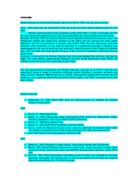Another important example of decisive leadership was Gustav Stresemann during the hyperinflation crisis of 1923. At that time Germany was facing the greatest economic crisis in centuries with the prices sky rocketing and the value of money being almost meaningless. People lost faith in the Republic and the discontent was a threat to its future existence. However, Stresemann, unlike his predecessor was willing to make unpopular choices to save the economy. He called of the Ruhr resistance and resumed paying of the reparations to the Allies. He burned all of the existing money and proceeded creating the new currency, Rentenmark. The economy was stabilized and potential threat to the Republic neutralized. Furthermore, Stresemann’s actions gained sympathy from the Allies, and the reparations were decreased. This decreased the stress the people had to go through and helped ensure the survival of the Republic. Without Stresseman and his actions it is likely the Republic would have collapsed during this period.
In retrospect, the leadership and organization from the Republics opponents was ineffective and disorganized. For example, during the early years of the Republic, the nation faced series of revolts from the extreme left. On 6th January 1919, the Spartacus League, under the leadership of Liebknecht and Luxemburg, occupied the newspapers offices, government buildings and railway stations in Berlin. They were trying to create a soviet style government present in Russia. However, the Spartacists only had about 5,000 people in Berlin at the time. They didn’t have sufficient mass appeal to carry out a spontaneous uprising as in Russia. They were outnumbered and had very little equipment to carry out the takeover. The Freikorps had no problem to destroy the rebels, and with the death of Liebknecht and Luxemburg, the extreme left lost any chance of effective leadership. As such their threat was never truly serious at that time, and the Republic didn’t have too much trouble to defend itself against the extreme left, in spite of the wide range panic Spartacist’s brought. Their disorganisation was their downfall, and it ensured that the left will never be strong enough to pose a serious threat to the Republic.
Similarly, the Republic faced the threat from the right. Although the extremist right had a far more wide-ranging support than the left, especially in the elite aspects of the society, they were divided. The right was divided over the Monarchist such as DNVP and Nationalist groups such as NDSAP. This division ensured that they were never strong enough to combine and overthrow the government. The two most famous attempts to do so, the Kapp and Munich Putsches also shows the disorganization and the idealism of the right wing leaders. In 1920 Kapp Putsch, Wolfgang Kapp invaded Berlin with 5,000 Freikorps soldiers. However, he was unprepared for the widespread resistance from the working class supporters of the Republic. Also, he failed to gain the support of the Army in general, which was a serious handicap. Another example of a divided front among the right was the Munich Putsch, where Nazi leader, Adolf Hitler, proclaimed a revolution with a gun pointed to a right wing supporter Lossow and Kahr. He then failed to secure them and they escaped, warning the government. The Putsch was a failure highlighting the disorganization of the right opposition. Because of these problems, the right was never strong enough to topple the government, and the Republic was able to survive the threats the right extremists posed.
Another central factor Republic survived was that, in spite of the opposition from both left and right, the Republic did have a widespread support among the people. Most people accepted the Republic and the pro-Republic parties. This can be seen from situations such as the Kapp Putsch, where ordinary workers and supporters of the Republic stopped Kapp by going on widespread strike. They ensured the Republics survival during this incident. Furthermore, the popularity of the republic during these years can be seen from the election results. In 1919 elections the pro-Republic parties managed to secure 80.6% of the vote, while in May 1924 they had 52% of the vote. From this it can be seen that during this period majority of the people supported the government and wanted it to survive. And as such it was able to meet the various threats and to preserve.
Finally, the government had a major asset in the agreement Ebert had with Groner. Without the support of the army no opposition could truly be effective. The army’s support of the Republic, although given grudgingly was priceless. This can be seen from situations such as crushing of the Sparatcist revolt and the Munich Putsch. Furthermore, the army’s neutrality during the Kapp Putsch ensured that it couldn’t be successful. As long as the army stayed on the Republics side, the government was able to survive any threat it faced.
The threats Weimar Republic faced between 1919 to 1924 were numerous. However, the Republic survived. This can be attributed to a mixture of the governments strengths and the weaknesses of its enemies. The Republic during this period had strong and decisive leadership in Ebert and Stresemann, while their enemies on the right and the left had poor leadership and bad organization. The government had a wider-range support, while the left and the right never managed to achieve majority support. The support of the army was a decisive point. The Republic survived the threats and went on to thrive in the Weimar’s Golden years.







